#so their fates aren’t necessarily guaranteed to line up
Text
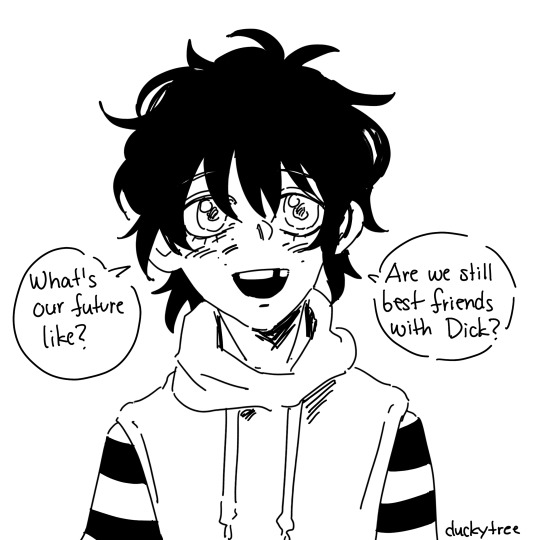
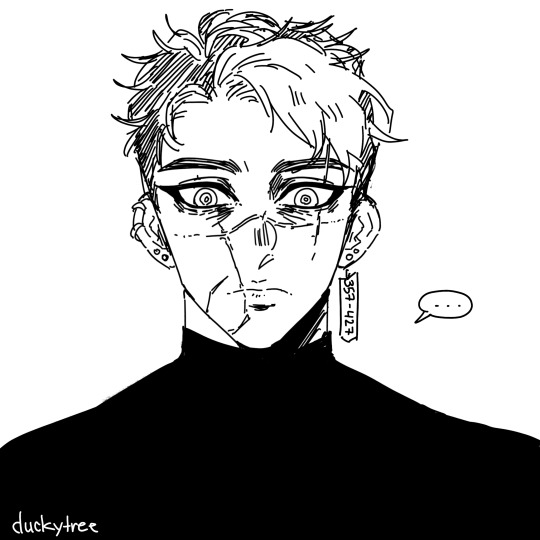
personally i feel yall been happy a bit too long
#if it’s any consolation this is ‘big brother jason’ and ‘dear jason’ jason#so their fates aren’t necessarily guaranteed to line up#dear jason#big brother series#art#fanart#jason todd#red hood#dick grayson#nightwing#batman#dc#comic#duckytree
3K notes
·
View notes
Text
Psycho Analysis: Senator Armstrong

(WARNING! This analysis contains MAJOR SPOILERS! Hell, just knowing Armstrong is the ultimate final boss is kind of a spoiler.)
The Metal Gear series is known for quite a few things: ridiculous over-the-top characters, complex and entertaining villains, awesome boss battles, and just generally being absolutely insane while also being very philosophical and deep. Now imagine, if you will, if all of those things congealed together into a single character. That, my friends, is Senator Armstrong, the final boss of Metal Gear Rising and easily one of the greatest characters in the entire franchise. He only has the cutscenes prior to his boss fight to establish himself, but I guarantee that you will never forget this man after you’ve beaten him.
Actor: Armstrong is portrayed by Alastair Duncan, who you may know as Alfred Pennyworth from The Batman, Mimir from the 2018 God of War, or Councilor Sparatus from Mass Effect. To say he does an incredible job is an understatement; his performance is easily the most hilariously quotable one in a franchise where nearly every single character is hilariously quotable.
Motivation/Goals: For a villain who comes almost entirely out of nowhere, he sure does deliver a very well thought out speech about his true motives:
"'I have a dream.' That one day every person in this nation will control their own destiny. A nation of the truly free, dammit. A nation of action, not words, ruled by strength, not committee! Where the law changes to suit the individual, not the other way around. Where power and justice are back where they belong: in the hands of the people! Where every man is free to think — to act — for himself! Fuck all these limp-dick lawyers and chickenshit bureaucrats. Fuck this 24-hour Internet spew of trivia and celebrity bullshit! Fuck American pride! Fuck the media! FUCK ALL OF IT! America is diseased. Rotten to the core. There's no saving it — we need to pull it out by the roots. Wipe the slate clean. BURN IT DOWN! And from the ashes a new America will be born. Evolved, but untamed! The weak will be purged and the strongest will thrive — free to live as they see fit, they'll make America great again! ... In my new America, people will die and kill for what they BELIEVE! Not for money. not for oil! Not for what they're told is right. Every man will be free to fight his own wars!"
Now, for those who don’t quite understand, let me explain: Armstrong wishes to end war as a business and create a Social Darwinist utopia, where all the citizens of America fight their own battles and the strong survive while the weak perish. From a certain point of view, his arguments actually do make sense, and considering America, and by extension the world, were until recently controlled by the whims of the Patriot AI, it’s not hard to see where he’s coming from. For what it’s worth, he very much despises the Patriots; in fact, Armstrong is ideologically quite similar to fellow Patriot-hating politician George Sears, AKA Solidus Snake, who coincidentally Raiden also fought. Hell, much like Solidus, Armstrong also has some connection to the creation of child soldiers.
Of course, it needs to be noted that while Armstrong definitely makes a good case, he is also a bonafide anti-villain. For those who need clarification, TVTropes describes an anti-villain as “a character with heroic goals, personality traits, and/or virtues who is ultimately villainous. Their desired ends are mostly good, but their means of getting there are evil. Alternatively, their desired ends are evil, but on a personal level they are far more ethical or moral than most villains and they thus use fairly benign means to achieve it, and can be heroic on occasion. They could also be someone or something whose desired ends or means are not necessarily ‘evil’ at all, but their actions simply conflict with that of whoever seems to be the protagonist.” While he does have good intentions and seems to genuinely want to better his country, the fact he resorts to terrorist actions, child soldiers, and ridiculous levels of violence makes him clearly the bad guy.
Personality: Armstrong’s personality is very, very intense. He is a man capable of delivering the most impassioned, honest speeches you will ever hear from a politician… and according to him, he doesn’t even write his own speeches! He is loud, he’s brash, he’s proud, he curses up a storm, but he also has lines he won’t cross and shows nothing but respect for those he fights, and when he beats Sam in the DLC storyline and when Raiden defeats him, he has nothing but respect for the men. It’s honestly impressive how they could cram so much nuanced personality into a man that is maybe onscreen for twenty minutes tops.
Final Fate: Of course, as is the fate of any politician who thinks he can beat Raiden, he is not only killed, but has his heart ripped out by Raiden and crushed in his hands.
Best Scene: The entirety of his speech to Raiden, where he explains his entire plan. Mostly for the fact that Raiden is likely as stunned by all of this as any first-time player.
Best Quote: Literally everything out of this man’s mouth is golden; there’s a reason he’s one of the most quoted, meme-worthy characters in one of the most quotable, meme-worthy games of all time. But credit where credit is due, his immortal words to Raiden as he kicks him like a football and apparently rips a hole in the fourth wall that lets in the cheering of a stadium crowd stand out:
“Don’t fuck with this senator!”
Final Thoughts & Score: Let’s get this out of the way right off the bat: Armstrong is an easy 10/10. But why is that? Well, beyond his personality, which basically consumes your attention, there’s a lot of symbolism to his final match with Raiden.
Firstly, there is the fact his philosophy is very similar to Raiden’s mentor’s philosophy. Much like Solid Snake, Armstrong sees a world where soldiers fight and die for causes they don’t believe in, and citizens being suppressed by meaningless, trivial garbage. The philosophies fork from there: Snake wished for a world of peace, where there would be no need for fighting anymore, while Armstrong wishes for a world of freedom, where all people choose to fight the battles that they want, where they decide what is worth fighting for and what isn’t. Armstrong knows he could never end all war; he just wants those who put their lives at stake to be doing it for good reasons, and not to line the pockets of bureaucrats. As Raiden carries on Snake’s philosophy in his own way, this is sort of a test of Armstrong’s ideologies, to see whose vision is truly worth upholding in this world.
This brings us into the symbolism of the fight itself, which is set up like a political debate, though of course one tailored to Armstrong’s “Might Makes Right” philosophy. Armstrong is running for president in 2020, so is it not fitting that he defend his viewpoints the way he believes they ought to be defended as the final great debate on the way to the presidency? There’s also the inherent symbolism in the weak vs. the strong, with Raiden representing all the long-suffering American people and Armstrong representing the politicians who prey on the weak. He is still a politician, and his philosophy outright values the strong over the weak, so Raiden is something for a voice for the voiceless, a hero to fight for those who cannot fight for themselves. Raiden in the battle represents what true strength should be: a tool of justice, used to protect those who cannot protect themselves, while Armstrong of course represents his own philosophies.
And of course, there is the fact that in the end, Armstrong s very much the shadow archetype to Raiden, a dark reflection of what he could be. As you may have noted, ultimately Raiden and Armstrong’s philosophies aren’t entirely different from each other. This is even pointed out in the song that plays over his battle, the epic “It Has To Be This Way.” The lyrics are as follows:
Standing here, I realize
You were just like me, trying to make history.
But who's to judge the right from wrong?
When our guard is down, I think we'll both agree
That violence breeds violence,
But in the end it has to be this way.
I've carved my own path, you've followed your wrath,
But maybe we're both the same.
The world has turned, and so many have burned,
But nobody is to blame.
Yet staring across this barren wasted land
I feel new life will be born beneath the bloodstained sand.
Beneath the bloodstained sand!
Armstrong isn’t just brilliant because he’s a hardcore badass whose every line is quotable and who is souped up on NANOMACHINES, SON! Armstrong is brilliant because of how he symbolically contrasts Raiden’s own philosophy and, even if he is ultimately defeated, has passed on some of his philosophy to Raiden in a way. Did Raiden not prove his philosophy was the correct one by killing Armstrong? Did Raiden not just fight for what he believed in, fought a war to prove the superiority of what he believed in?
Alongside Ocelot, the antagonizing forces of the Metal Gear series just didn’t get better than this.
135 notes
·
View notes
Text
#293 Fatal Flaws
Superheroes are far from perfect individuals. (And of course some are further than others.) They make mistakes, sometimes they lose, and all of them, every single one of them has their very own fatal flaw. A fatal flaw is a pattern. It’s a mistake that a hero keeps making. It’s a character defect that’s baked into their very soul, their very essence. If you meet a hero who doesn’t have a fatal flaw, then they’re definitely a villain in disguise who is over selling their part. As a superhero, you’d do well to be able to identify your own fatal flaw so you can try to get it under control before it becomes your undoing.
A fatal flaw is certainly nothing to be ashamed of, you can hardly expect perfection of yourself. Everyone here at How To Hero has one. (Zach’s is that he’s too much of a control freak.) Curly’s is that he cares too much about whether or not people like him which makes him easy to manipulate. {Wait, but that doesn’t make you guys like me any less right?} Lawyer Guy’s is his unbending love of the law. [There’s nothing wrong with not committing crimes.] And Parenthetical Guy’s is that he can’t talk about anything without turning it into a joke. (And Dr. Brainwave’s fatal flaw was his tendency to grab hold of bombs right before they exploded.) See what I mean? A fatal flaw doesn’t make you a bad person, it just makes you a person.
We’ve taken the liberty of compiling a list of the ten most common fatal flaws in superheroes. Even if we don’t end up talking about one of yours, you can learn a lot from understanding the fatal flaws of others so we didn’t waste your time!
Hubris: You remember the tragic tale of Hubris Man right? Unfortunately, he was far from the only hero to boast “hubris” as their fatal flaw. Having confidence is one thing, but you should always know your limits, and you should refrain from broadcasting all of your feats and skills, that’s just going to make you enemies and you don’t need any more of those!
Hero Complex: “But Zach, we’re all superheroes, and it’s all very complex!” Yes but superheroes that have a “hero complex” literally can’t deal with not being the hero. No matter what the situation is: Fighting a giant with missiles for arms. Flying two helicopters simultaneously. Picking up the salsa from the salsa store. They have to be the center of attention. They have to be the one to save the day. This isn’t born from hubris though. Usually the hero complex is rooted is massive amounts of anxiety and insecurity. Heroes who exhibit it don’t want to have to save the world. Every time. With no help. They just believe that they have to. They worry that nobody else will step up to the plate and so they take more upon themselves than is reasonable by any measure. Heroes with this complex need to learn how to put their faith in other heroes, and when to take a step back for the sake of their own physical and mental health.
Fearlessness: It’s great to be brave. We have a whole entry on how to face your fears so you can better fight crime. But fear is healthy. It helps you pick up on things your conscious mind might miss. It prevents you from getting too cocky (and see above for what happens when you get too cocky). You need fear to fuel you, to keep you alert, and to keep you humble. So if you’re a superhero who often finds themselves feeling no fear at all, it probably means you aren’t thinking hard enough about what’s going on. So take a beat to consider the threat you’re facing, and what’s at stake if you fail to stop it. Then, once you’ve acquainted yourself with the gravity of the situation, you can use your fear to push you farther than you thought you could ever go.
Being Uncompromising: Heroes often cannot compromise. They have to hold fast to their ideals. But sometimes a hero is too entrenched in the wrong ideals. Sometimes they have to let go of the principles they hold so dear in order to save the day. Sometimes they have to work with supervillains, sometimes they have to sacrifice a little to save a lot, sometimes they need to eat something really gross in order to stop an alien invasion. If you refuse to bend you’re guaranteed to break. So learn how to compromise.
Having a weak heel: This is one of the oldest and most classic fatal flaws. Having a heel that is so weak that a lucky shot at it can bring about your death. If you’ve got this fatal flaw I recommend getting titanium socks or just cutting your whole foot off and leaving it at home before a big battle.
Not being a morning/night person: Look, I get it, being a person for a whole 24 hours is hard. But as a superhero you need to be on call whenever. You never know when the ghosts of every bug humans have stepped on are going to get organized enough to launch a revenge invasion on the world of the living. It could happen morning, night, afternoon, whenever brunch is, and you need to be up and ready to go! You can’t be sleepy or cranky just because of the time. If this is your fatal flaw I recommend putting tiny robots in your head that will zap your brain awake whenever you start to get sleepy. And then other robots to massage your brain whenever you get cranky. [How To Hero is not liable if the zappy robots and the massage robots start an all out war inside your head.]
Being too good of a listener: Often in superhero job interviews, superheroes will be asked “what is your greatest weakness?” and often they will say “oh, I’ve been told that I’m a really good listener” and the interviewer will say “ok... but that’s not really a weakness...” and the hero will say “oh right, I’m too good of a listener?” And the interviewer will shrug and just mark that down. This happens often enough that this greatest weakness has made our list of common fatal flaws, but we’re not super convinced by its legitimacy. If you have this fatal flaw I recommend... I dunno... plugging your ears and not listening so much? Like what does listening too much even mean? How much is too much? I feel like you’re just sidestepping the question so you can avoid having to do any introspection and confronting your actual weaknesses.
Being too loyal: This is similar to “being too good of a listener” in that heroes will talk about it like its actually a good thing. But it isn’t. Loyalty is great of course, but it needs to have limits. You can’t risk the fate of the world for the lives of your friends. You can’t stand by your friends when they become supervillains (and mark our words, at some point, one of your friends will become a supervillain). Excessive loyalty will make you an easy mark for supervillains. All they’ll have to do is threaten your loved ones and you’ll do whatever they say. Of course, that’s why you have a secret identity, but presumably even your superhero persona has connections. Teammates, contacts, mascots. Excessive loyalty puts them all at risk! So if you ever feel yourself become too loyal, try to remember all the times your friends have let you down. See? It happens all the time! They’re not all that great after all!
Indecision: Superheroes have to make a lot of tough choices, and a lot of the time, they have to be quick choices. You’re not going to have time to weigh every option, to deliberate endlessly. Superheroes need to be able to make decisive action. You don’t want the world to be destroyed while you’re agonizing over the most efficient way to save it.
Impulsiveness: Superheroes have to make a lot of tough choices, and a lot of the time, those decisions require care and thoughtfulness. You need to weigh all your options. The first plan that pops into your head might not necessarily be the best one. So make sure you take a good long while to mull things over before acting.
As you can see, there’s a fine line between a fatal flaw and a virtue. Loyalty, fearlessness, heroism, these things are all good for a hero to have. But everything needs to be in moderation. If you lean too much in one direction you may find yourself losing yourself, and your life. (That’s why they’re called fatal.)
#superhero#superheroes#comics#comedy#humor#funny#hilarious#guide#how to#fatal flaws#flaws#heroism#loyalty#hubris#Dr. Brainwave#Parenthetical Guy#Curly#Zach#Lawyer Guy#morning person#night person#Achilles#Achilles heel#indecision#impulsiveness#job interviews
2 notes
·
View notes
Text
Spider-Girls #3 Thoughts

I’m trying to wrap up my Spider-Geddon coverage before Absolute Carnage kicks off. However I’m also got a summer cold and insomnia so finding a time when I’m in the right headspace to do that has been challenging. To my frustration it has also meant delays between reading issues which I feel negatively impacts my ability to analyse the issues. I rely upon you dear readers to thus correct me if I miss anything or get anything wrong.
With that disclaimer lets wrap up the mini-series which was the real reason I was interested in this event in the first place.
Due to my condition I don’t have nearly as much to say as I did with the last two issues.
What I do have to say is that this issue is a mixed bag, but unlike the last issue, a mixed bag leaning on the negative side of things.
Let me get some positives out of the way. The art continued to be beautiful. Mayday and Annie connecting was beautiful. The opening page montage was beautiful. Annie developing as a character more by proclaiming the training wheels are off (a call back to an earlier issue IIRC) was beautiful.
Now for something more mixed.
Annie in this issue has been reframed as a magic destiny child of sorts. In Benjy’s case back in Spider-Verse this wasn’t that big of a deal. He wasn’t a main character in Spider-Girl and his role was only relevant within the context of that story. It did not grant him any special pseudo Messianic abilities. It essentially made him a living plot point to be fought over.
The situation is the reverse with Annie. She was a main character of RYV and the main character of Spider-Girls and her role as ‘Patternmaker’ is a pseudo Messianic role granting her special powers that will be relevant to the resolution of Spider-Geddon by the looks of it.
This is very, very, very not in line with the core idea behind Spider-Man.
On the other hand as a fond farewell to a character who is already too similar to another teenage daughter of Spider-Man and MJ, differentiating her in this way helps make her more unique within the lasting legacy of both characters.
Another mixed thing was the decision to abandon Normie and the spider mutates in favour of seeking out Normie’s tech to fight the Inheritor twins. On the one hand this was not an impractical plan. In fact it’s coldly logical battle tactics. Putting aside how it took the combined strength of all 3 Spider-Girls to open the door* had Mayday and Anya jumped into the fray at best they’d have held their ground for awhile but also might’ve been in danger from the mutates too. Winning that fight was a remote possibility dependent upon the mutates helping them which was not guaranteed at all. On the other hand though...Mayday or Annie abandoning what amounts to civilians, even to get something to help them defend those same civilians better just seems...off to me. Maybe it’s in character but I think it’s at least debatable.
That’s it for anything positive.
This issue I think is fundamentally hurt due to being both the third of three issues and leading into the climax of the over all event. Scarlet Spiders believe it or not did this better as the final issue was about Ben and his death motivated Kaine’s actions back into the main Spider-Verse book (which was ASM). Whilst the resolution of this series will likely be relevant to the resolution to the event as a whole, it’s very much the case that the latter was at the expense of the former.
Mayday and Annie’s emotional climax for instance feels slightly undercooked even though it gives you what you want. Anya was utterly superfluous in the whole series (to the point where I wonder if her inclusion was a mandate from above. Normie and the spider mutate’s fate’s are left totally unresolved and they truly are just left to the mercy of the Inheritors’ (just because they aren’t spiders doesn’t mean they’re safe). The climax involving the Inheritors was underwhelming, Annie didn’t even fight them really. The fact that we had 2 twins in a series with Mayday and Annie as pseudo sisters was never utilized. The fact that a radioactive punch from Spider-Man can hurt Morlun a lot but a radioactive cannon blast from a mech robot can be shrugged off by Brix and Bora is nonsensical. And the method by which the mutates are cured and the Spider-Girls escape is essentially a dues ex machina.
So yeah...a very unsatisfying resolution to what had been the strongest part of Spider-Geddon thus far. And a sorry end to RYV as a whole I’m afraid to say. Better perhaps than RYV’s actual final arc but still underwhelming.
If we’d had one extra issue things might’ve been so very different.
Alas.
P.S. Didn't Spider-Geddon #4 establish that by destroying the Web of Life and Destiny (which we see wrecked in this issue) interdimensional travel would be impossible? If so then how did Annie get the Spider-Girls to Loomworld or anywhere else? More magic dues ex machina BS?
*Initially I thought that was suspect. Surely Spider-Man is strong enough to break open an reinforced door. But then thinking about it it’s very possible, Norman, Harry or Normie designed their security measures with Spidey in mind. But not necessarily 3 people with their powers
#Spider-Man#Spiderling#Spider-Girl#Spider Woman#Annie May Parker#Mayday Parker#anya corazon#May Parker#May Mayday Parker#mc2#mc2 univers#Spider-Man: renew your vows#Amazing Spider-Man: Renew Your Vows#Jody Houser#Spider-Geddon
14 notes
·
View notes
Photo

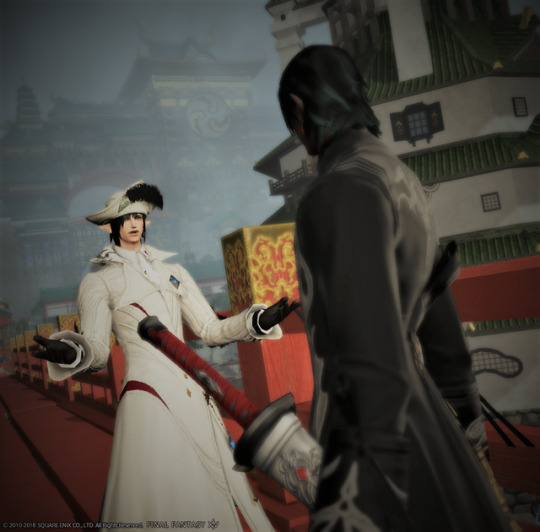
Fair Trade and Leverage 11/19
"What we have to discuss is not necessarily suitable for uninvolved parties," Leon Robinaux leads the way, finding a spot upon the balcony where they cannot easily be heard, but which does not make it look as if they're trying to hide. "Now then," He says in a slightly lower voice, "we have some business to settle between us, do we not? I have discussed your claims and proposal to the boss, and he is… skeptical. Intrigued, but skeptical. He wonders just how much power you truly hold over Vidal. He believes that a demonstration is in order, and I agree."
Lebeaux Desrosiers rolled his shoulders and walked along with Leon casually towards the railing of the platform. He turned to lean casually against it, holding onto the rail. Just to be entirely sure that he wouldn’t be easily tossed over should the other decide he didn’t care for his replies. “I never agreed to hand him over to you or coerce him into working for you.” He pointed out calmly. “I offered to keep him out of your way. Which I have done.”
Leon snorts softly, as if Lebeaux has just told a little joke. "And how does that benefit us, ultimately? The only reason he still lives right now is because I allowed him that chance. And do you know why I did that? Because the boss still believes Vidal can be useful. So, do you understand now? If he never works for us, there's no reason to let him live. The best means of keeping him out of our way is to eliminate him. I want to trust you, of course. He's the one I don't trust, and I doubt you should, either."
Lebeaux tilted his head slightly as he smiled at Leon. “If you want him to benefit you, you should be off cutting deals with him rather than me.” He noted. “Oh, right. You stabbed him. You’re likely the last person he would be willing to work with.” His chin lifted slightly so he could smirk down his nose to Leon. “Let’s say I were to indulge you and agree to at least listen to your demands. What would your boss want by way of a demonstration."
"Michaux made it clear he had no intention of working with me when he stole from me with just surprising audacity," Leon says, waving off this suggestion. "If I were to dangle Solenne's fate before him… But no. I imagine that would only work once. Then I would either be forced to repay him, and thus lose my last tenuous hold on all three of them, or I would have to break our agreement, which will certainly dissuade him from working for me again. It would be better if I could keep him on a leash in some other way." He smiles when Lebeaux asks about the demonstration. "Ah, yes. One of those pirates from the Ruby Sea was recently captured for questioning on.. a certain matter, but she is proving extremely difficult to interrogate. Dismembering her to get the information I need would be inconvenient, but Michaux could obtain it easily."
The Ishgardian slowly tilted his head in the other direction, smiling all the while as he considered that. “There would be conditions. I wouldn’t agree to bringing him to you and your boss, seeing as there’s no guarantee that you wouldn’t harm him. Arrangements could be made to do the questioning at another location of my choosing. Bring your own subject.” He suggested cheerfully despite the subject matter. “But.” He held up a finger. “One little problem.” He pointed out. “You and your boss have still done nothing for me. I’ve no incentive to help either of you.”
"We thought you might stipulate something of the kind. I would accompany the prisoner myself, of course, and several guards to keep her in line. The guards can keep their distance, however. I would agree to do it in a location of your choice." He huffs and smiles faintly. "Yes, of course. Money will be yours, and limited access to our spy network. Possibly access even to our assassins, if you prove valuable enough. But you want something more than that, don't you? Tell me, how much do you know about Solenne's activities while she was in Hingashi?"
Lebeaux allowed his gaze to drift away from the Duskwight, as though he was losing interest in the conversation. Pale eyes moving over the skyline and the ships in the harbor before they drifted back over towards the bathhouse. “I haven’t bothered to look into them.” It didn’t matter to him if she burned this place to the ground with her shady dealings. His grudge was far older than that. “I doubt that knowledge will be more satisfying than knowing she was gone for good and would never be able to interfere again.”
Leon's smile widens. "Why, I am surprised at you, Lebeaux. I've heard you were quite a shrewd man." He reaches up to brush a few strands of hair from his eyes. "You don't consider knowledge that could bring about her execution satisfying? The prospect of holding such information over her head - and Idristan's - doesn't interest you at all? Well, if that is the case, perhaps we should go our separate ways."
Lebeaux allowed his gaze to continue to roam until it circled back to Leon, settling it briefly on the other’s smile. “I’ve had my hands full in other matters. The pair of burnt-out heretics aren’t going anywhere anytime soon.” He noted calmly, lifting his hands from the railing to cross his arms over his chest. “Is that what you’re offering in exchange for my cooperation in coercing Michaux to aid you. Damning information and evidence against Solenne.”
"Burnt out heretics," Leon repeats, looking even more amused. "I have recently been given to understand that they intend to go wherever they wish, and do whatever they wish, even if it's likely to bring about a direct confrontation with me. Do you think you're immune? Ah, perhaps you do, using their friend as a shield. An excellent tactic, by the way. Too bad I might have to remove him from your grasp." He taps his chin, looking thoughtful. "Yes, I do have permission now to offer you such evidence against Solenne."
The medic toyed lightly with the edge of his sleeve before he smoothed it out again, keeping his arms folded over his chest. “I suspect I’m immune until they find a method of dealing with you.” He noted. “Considering my truce with Idristan, I am the lesser target for the time being.” Honestly he was just waiting for one to take the other out, either way. “And should you talk like that, it’s truly not very conducive to convincing me to bring Michaux around you. Why would I share my toys when you’ve threatened to take them away or break them.” He teased with a smirk. “Unless. Unless you give me a down payment on your end of the bargain. A taste to ensure what you’re offering is worth my time and not common knowledge.”
"Of course I would not remove him if you prove to have enough control over him to make him useful," Leon points out. "Isn't that part of what we're bargaining for? Let's see though. A little taste. Hmm… I wonder if you have heard the fuss about the recent assassination of a noble in Bukyo? Perhaps not, if you've had your hands full. It's quite a scandal. It was a foreign woman who received special permission to pass beyond the gates of Kugane because she was another noble's concubine. You must have heard this part, though. You have met that noble yourself." He tilts his head to one side. "How it has horrified the nation. A foreign woman - an Elezen - assassinating one of our elite. It is thought that she is dead, but should she ever be found alive, I can readily imagine what would become of her."
Lebeaux listened with a calculated air of disinterest. As though such things were below him. But after the tale was told he uncrossed his arms from his chest and pushed lightly away from the railing. “Very well. I’ll have to do a bit of looking around to check the veracity of the fable you’ve fed me. But should things seem to add up I shall be in touch to arrange that rendezvous between Michaux and your honored guest.” He offered. “Lovely as this all has been, I shall resume my plans to have a bath. Spending too long around you makes me desire one all the more.” He offered cheerfully. “Good day, Leon.”
Leon eyes Lebeaux calmly, his smile faded. But not because he is disappointed. No, despite his air of indifference, Lebeaux does seem interested in this small taste of Solenne's sordid Hingan visit. Instead of hemming or hawing further, he seems interested in this bait. Perfect. "Very well. Thank you for giving me a few minutes of your time, Lebeaux. I look forward to hearing from you quite soon." He seems poised to leave, but then he pauses. "Give Michaux my regards next time you see him." And with that, he walks away.
@secrets-and-aetherlight
#lebeaux#leon#he doesn't seem to have a problem putting someone else's neck in a noose#poor mich#plotting for him
7 notes
·
View notes
Text
13x20: “I don’t care what happens to me”-- Dean Worthless Winchester, John Winchester’s Death and Destiel
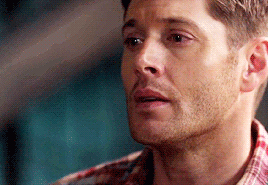
Oh my god!
I gotta say, 13x20 was an ANGSTY FEELSY amalgamation of meta and foreshadowing for the Big Finale Triad of 21, 22, and 23. It laid down S5 tones, key themes, and narrative direction, hoo boy!!!
I’m sorry I posted late! Time-of-month sickness was an interruption, yikes.
I’d like to start with the Dean & Sam final scene, then talk about the major culminating implications this Father-centric episode specifically holds for our beloved protagonist Dean Winchester the shackled child — the Man behind the Mask (which S13 has been a gigantic narrative mirror of) — and the Destiel narrative/Cas in relation to Dean’s arc and character disposition *rubs hands together*
Glynn & Co made Dean’s axel-swinging between communication and miscommunication pretty clear to me in the last scene of 13x20, especially regarding the dialogue that people thought was character regression into Brodependency.
After sleeping on it, I didn’t see the same scale of toxic codependency from seasons ago a la ‘there ain’t no me if there ain’t no you.’ It wasn’t mutual. I saw it as: 1. more from Sam’s end, and 2. Dean’s willingness to protect his loved ones (Sam and CAS, in bold) combined with letting go and the textual acknowledgement of his low self-worth carrying over from 13x05 (the low self-worth he internalized across 99.6798% of his life course).
Firstly, Dabb’s subverting S5.
He put independent Dean in S5 independent Sam’s shoes here, and it’s surely not a coincidence that Dean himself referenced their implosive S5 Michael-Lucifer mess: “Where we were last time we had front row seats”. S5 exhibited Dean’s Holding On vs Sam’s Letting Go, with lost Dean crawling to Lisa’s door and yeah, we know how that prickly-edged story went. It’s finally Dean Letting Go vs Sam Holding On. It’s indicative of S13 faithless Grieving!Sam re: Mary/Jack seeking his own emancipation and finding real introspective purpose away from the codependent strings he’s clinging to. We heard Sam’s “If we die, we die together”. Don’t fret, his current arc is constructed to get rid of this kind of thinking and move towards Faith!
Dean’s prepared to cut the codependent strings — already has via 12x22, and then in 13x05 (albeit in a suicidal grief-ridden manner. Speaking of, 13x20 this time shifted focus to Sam’s risk-taking re: Lucifer and the Apocalypse in itself. Unsurprisingly, we already witnessed this narrative train running in reverse -- early S13 Grieving!Dean and Functioning Sam swapped roles post-13x06 and in 13x11. Man, I am pumpin’ my fists).
Atop the bro dualism, Dean’s behaviour in 13x20 concerned me the most, saddened me the most, and intrigued me the most.
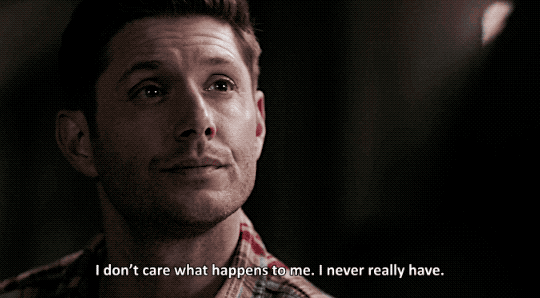
:’(
I may have yelled said that Dean has emotionally matured, eliminated toxic coping mechanisms, achieved an internal balance between his femininity and non-performative masculinity (acknowledged in 13x04; actively manifested in 13x16 onwards x, x), and gained a sense of non-combative communication and understanding (seen in 13x14), yet his low self-worth constitutes the biggest roadblock to his FULL personal growth.
Okay, I know you’ll exclaim: after Cas returned, Dean wasn’t depressed anymore!
Well, that’s accurate and relatively inaccurate. Dean’s low self-worth is the central facet of his characteristic development, and it does have a guaranteed correlation with depression. Yes, you can feel worthless without being clinically depressed, but worthlessness is maladaptive and contributes to feeling depressed --> Dean’s depression.
Dean’s case is a heartbreaking one. He’s been depressed for YEARS. He never really cared about what happened to him for YEARS = our Dean meta textualized in gloomy letters!!
Yes, the single individual -- the canon WIN -- that placed him back on the rails was Cas, his Everything, resurrecting from the dead. Cas’ return drastically mitigated Dean’s severe nihilistic depression (aka his rock bottom nihilistic grief when he lost Cas) BUT it didn’t necessarily fix his pre-existing depression.
S13 depicts Dean -- despite Cas’ bright presence -- as traveling the rails empty. There’s not enough coal to fuel his engine because he LACKS the mental faculties to appropriately cope re: trauma and give up his control. This is why he seems to oscillate between character progression and regression, and he still isn’t 100% HONEST and OPEN about his feelings. He’s keepin’ it in. There’s no healthy psychological unload taking place.
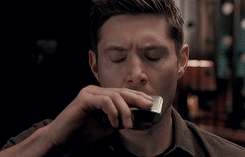
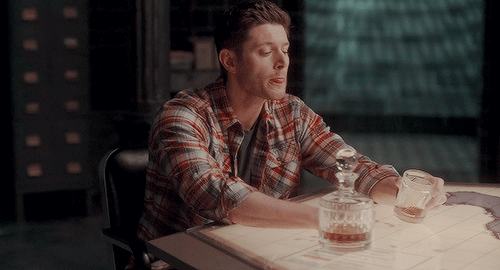
Case in point? Dean’s regressed to drinking the hard booze again; Cas FILLS the negative spaces (as he’s been doing throughout S13). Dean is not disclosing the whole truth -- not saying what he’s genuinely feeling (to CAS. I discuss it x, x, x).
Plus, Dean’s internal worries re: Death, the next apocalyptic war, Cas’ Heavenly plans, and his respective destiny/fate (Death’s “See you soon”) just exacerbate the personal instability he’s experiencing.
And then we observe Dean’s parental duty rearing its head:
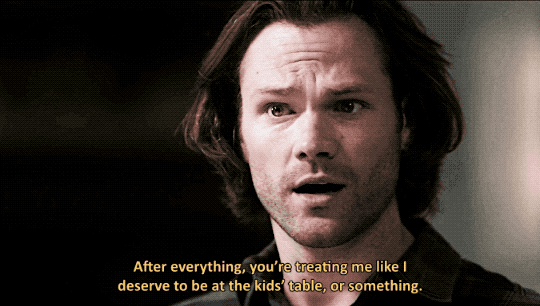
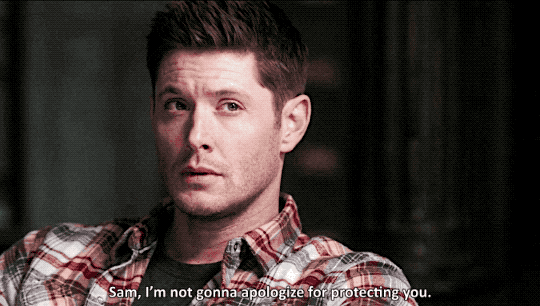
To me this is what reiterated the Brodependency being dismantled in late S12/S13 (12x22 and 13x12/15 in particular). Don’t get me wrong – Dean’s mostly let go. He was willing to leave Sam behind in 13x05 after losing the one person who textually means Everything to him.
Dean’s psyche is at a point right now where he AIN’T okay with Sam’s risk-taking. He questions his little brother’s half-baked plans and sympathizes with the close-to-here manic desperation (again, mirroring S5 and S13 Grieving!Dean), except Dean’s low self-worth puts him in the dark position: I’m doing it, all of it, for YOU (Sam and Cas) since I don’t value myself enough to do it for ME. He further says--

He obviously does, but us, the audience, know--in dramatic irony fashion--that this is NOT Dean’s entire truth.
He values his brother more than himself, and he values CAS more than himself. He cares about what happens to CAS. Nothing Else Matters. And we’re aware that Cas canonically occupies the highest pedestal in Dean’s life, which TPTB absolutely highlighted during Dean’s grieving arc, Cas’ return, and 13x16 onwards.
(In this scene, Dean continues to tell Sam what he’s NOT telling Cas. USE THE RIGHT WORDS.)
Cas is the love of Dean’s life, his Everything, and his Win. I mentioned before that losing Cas a second time would destroy him.
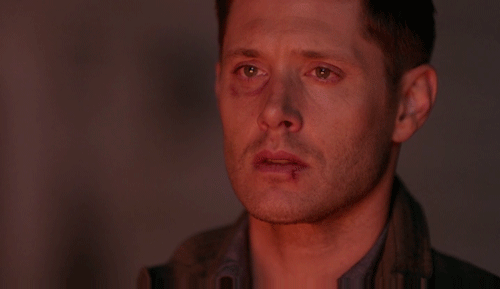
(**Dating 101: Dean therefore cannot establish a truly healthy, mutually interdependent relationship with Cas if he has low self-worth. He’s trying, but his personal losses -- more LOSSES than wins this season i.e. AU!Charlie/Mary/Jack in AU, non-confronted traumas i.e. Cas’ death, and insecurities cripple his ability to give Cas ALL of himself, out in the open!)
Although Dean HAS FAITH (Cas), the decisions he’ll formulate to protect/save Sam, Mary, Jack, and especially Cas aren’t exactly derived from mental stability. Keeping them safe is too paramount to Dean that the choices he’ll encounter could be questionable/dangerous, putting him in the line of (sacrificial) fire.
Sound familiar? It’s deliberately supposed to sound familiar!
Jack, TFW’s Unity/Balance symbol and characteristic mirror, even stated that ‘if he can’t keep others safe, what’s the use’?
Dean will make the penultimate save-the-world (read: save my family) decision ALONE regardless of Sam’s regressive wish to die together. And I wrote that his arc is now DIRECTLY paralleling S11 Casifer & Depressed!Cas’ S11/12 arc, especially (mis)communicative 12x19 --> 12x23 ‘I Have Faith’ Cas. There’s prevalent narrative symmetry in Dean’s arc (intrinsically linked to Cas’ arc).
“You, me, and Sam...we’re just better together” indeed, and this year’s season-ender should unite TFW like last season--unite Dean and Cas--in order to change their fates/defeat Death, but Dean’s decision will be an isolated one --> one that was foreshadowed as he faced expositional Daddy Issues™ Loki by himself. And Dean may not tell Cas, just like Cas hadn’t told Dean in 12x23 about his sacrificial act.
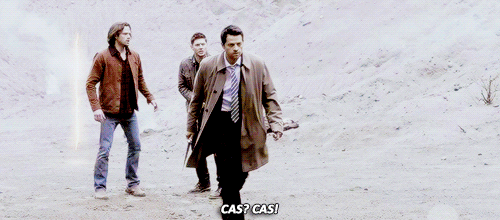
These vastly important storytelling threads ultimately conjoin with “I don’t care what happens to me. I never really have” as the PINNACLE of Dean’s 13-year long characterization; the progressive climax sparking his death/decay so that he can be reborn and revitalized aka THIS IS IT!! Dean’s impending death and self-sacrifice for his loved ones (CAS) = the ultimate catharsis in that S13′s narrative has finally approached the IRL scenario of 13x16 ghost kid (DEAN)’s release from father figure Bad Man -- from the negative influence of all the other literal (Loki, Odin, Lucifer, James Turner) and metaphorical (Asmodeus, Buddy, Michael) fatherly mirrors permeating this season. He’ll LET GO of everything that incarcerated him since he was 4 years old: his Blunt Tool role, control, manipulation, parental abuse and absenteeism, parental duty, the heteronormative patriarchy, and the long-standing trauma slapped on him by Alastair, Amara, and Cain.
He’ll burn the remaining pocket knife of all pocket knives tethering him to his past -- John Winchester x, x He’ll self-transform.
And Dean’s S13 death would fulfill the sacrificial Act of True Love (with Cas holding heavy weight in Dean’s decision for LOVE)--
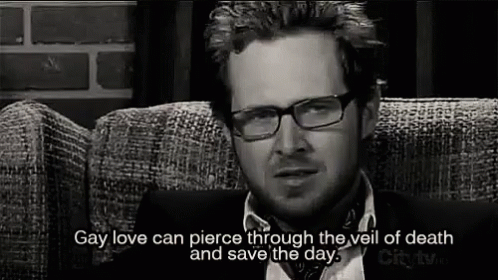
--and S14 Winning Him Back in the subverted flavour of S10. Romance tropes abound!!
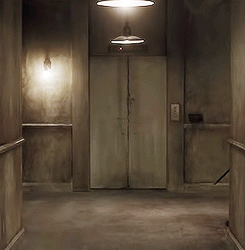
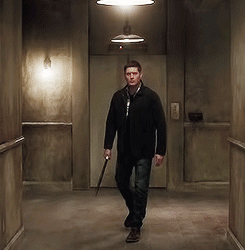
@thetwistedwillow and @sactownbrowns3 both ignited my stomach-churning feels. This is an extremely pivotal visual. The Michael-reminiscent sword and radiant halo-like lights atop Dean’s head? Yeah, set off HUGE Michael!Dean radars. Complete moral dualism with S10 Demon!Dean--selflessness vs selfishness. Free choice (saying yes to possession) vs stolen choice (demon transformation against his will).

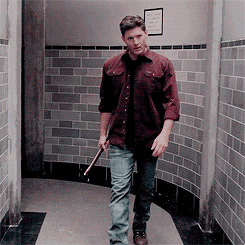
Secondly, as aforementioned, Dean’s harbouring a LOT of traumas he hasn’t mentally confronted, with Daddy Issues™ re: John Winchester (reflected via Dean’s solo faceoff with Loki) as his overarching undealt source of trauma.
Loki tells Dean: “The truth is, [Odin] despised me, but he was my father. I’m sure you understand. What would you do for your father?”
And Dean stabs Loki’s hologram. He stabs the metaphorical father figure who neglected his sons. He stabs another narrative embodiment of John’s ghost, foreshadowing that Dean’s death = John Winchester’s final death. It’s time to deconstruct and conquer his influence.
(Gabriel was an extended mirror of both Dean and Sam, too. Gabe, the little brother whom deadbeat Daddy Chuck never paid attention to. ‘Ah, big bros, right? Always think they know best’ Gabe, who stabbed and killed deadbeat Loki. Gabe, who subsequently ran away from home, was used and tortured beneath Asmodeus’ control, embarked on a revenge trip, and didn’t feel good about it. Dean and Sam themselves knew what it felt like to be manipulated. While it’s true that their traumatic experiences are subjective, they share common Deadbeat Father-adjacent life courses.)
What beautiful and consistent silent storytelling!!
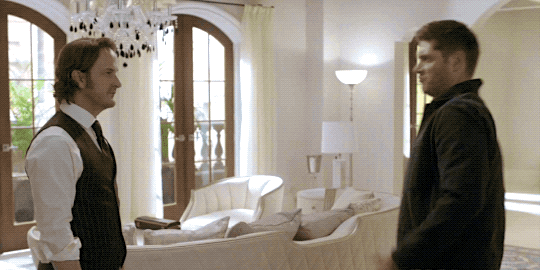
And oh look, narratively associated to this ^^ is the reappearance of Dean’s John-linked BAG OF EMOTIONAL BAGGAGE--

I can’t can’t can’t wait for him to let go of it PERMANENTLY!
And of course, Cas’ death remains his immediate significant source of undealt trauma (same links above: x, x, x)

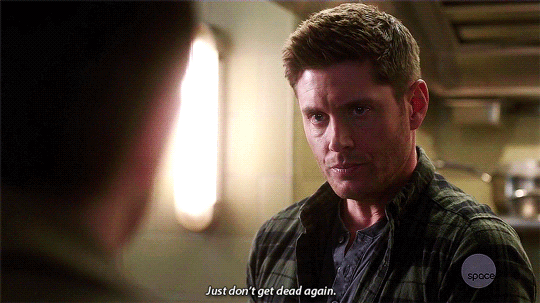
*looks at Dean’s serious, intense, and emotionally laden expression* *clutches chest tight* *blinks away tears*
I additionally wrote something about Endverse!Cas and D/C (mis)communication a few months ago which I feel is relevant again:
And we know HUMAN Endverse!Cas was representative of that, a sad, depressed, and hollow depiction of the wrong choices for the right reasons who festers (AND DIES), in part because of Dean’s wrong choices, and also because of his own consciously uninformed, narrow-minded choices that led to this literal apocalypse of mind, body and soul.
5x04 laid down what Cas (and Dean) shouldn’t become. If both Cas and Dean (TFW) continue to fail in learning their lessons regarding healthy interdependence (where control must become equality; ignorance must become understanding; intransigence must become compromise; stonewalling must become transparency; lying must become honesty; silence must become communication), Endverse will be their life.
Thankfully, they’re learning as of S13 onwards and I’m ECSTATIC. Slow but sure progress (13x15′s conveying the shift), yet they still have to use the RIGHT WORDS.
Endverse!Dean, who never gave up his control to Cas nor listened to him, was himself consumed by the NEED over the WANT and an authoritarian means to an end. He lost everyone. And Endverse posed an ultimatum for Dean (and Cas’ own characteristic progress): keep your control forever, and you’ll have one destination–no growth, no life, no freedom.
Full circle!

Dean Winchester must die so he can live.
And what are Dean’s WINS (plural) by dying? Saving people instead of losing people--saving Mary, Jack, Sam, and Cas. Saving the world. Reuniting his family unit. Interacting instead of performing. OUTING INSTEAD OF HIDING. HIGH DEPRESSIONLESS SELF-WORTH INSTEAD OF LOW DEPRESSIVE SELF-WORTH.
Better yet, Dean will undergo character development in relation to his loved ones (and Cas). With high self-worth, Dean’s capable of learning how to value HIMSELF independently. In turn, without personal obstacles he’ll learn how to sustain HEALTHY interdependent relationships and COMMUNICATION as well as learn how to WHOLLY GIVE HIMSELF to others (Cas).
Tell Cas he’s not expendable, Dean. Disclose the real reason YOU “needed him back”. Expose your feelings, choose Want over Need, and push away your rejection fears! Cas loves you dearly—let him know that his love for you is reciprocated. Nothing but good things ahead!!
Gosh, this post is way longer than I expected—thank youu for sticking to it! Circumstances shall get worse before they get better, and it’s totally necessary to ensure our characters meet the final demise of their prisons.
BTW, I still can’t believe we got a borderline blatant onscreen bi!Dean (and Cas insert) treat!! What’s by is by! Overall I’m incessantly praising Dabb’s spectacular work so far + Glynn and Rich Speight Jr’s craft in this ep!!
Very little sub is left in the text, my friends. TPTB are rendering years’ worth of meta increasingly explicit in S13. I can only HOPE and expect that 13x23/S14 brings us past the Point of Know Return subtextual boundaries and into full-blown textual narrative! Authorial intent EXISTS.
**I know, I know--S14 wasn’t confirmed as the last season and S15 is fair game. The plot accordion, as per usual, re-emerges with the slight overhaul/pullback of characteristic arcs and narrative plot due to season renewals, but I’m Endgame Positive that slow progress is SURE progress. Imho Dean and Cas are so close in saying everything from saying nothing. THE UNSAID WILL BE SAID.
Bracing myself for the last 3 episodes—they’ll burn us in awesome ways!!
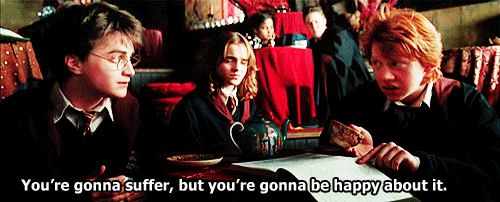
#long post for ts#spn s13#my meta#my stuff#destiel#character development#narrative#endgame destiel#canon destiel#textual destiel#bag symbolism#bags and emotional baggage#13x20#13x23#spn s13 speculation#silent storytelling#IN DABB WE TRUST#supernatural#deancas#parallels#dean is in love with cas#dean winchester#performing!dean#want vs need#miscommunication#communicate before it’s too late#USE YOUR WORDS#tw: depression#dean is bi#john winchester's a+ parenting
209 notes
·
View notes
Text
The Witchfinders
Latest Review: Written by Joy Wilkinson Directed by Sallie Aprahamian Executive Producers: Matt Strevens and Chris Chibnall Producer: Alex Mercer Starring Jodie Whittaker Bradley Walsh, Mandip Gill, Tosin Cole Alan Cumming, Siobhan Finneran, Tilly Steele, Tricia Kelly Stavros Demetraki, Arthur Kay A BBC Studios Production for BBC One First broadcast on BBC One, Sunday 25 November 2018 Running time: 46 minutes 31 seconds (source: BBC iPlayer) The Witchfinders is Doctor Who's third foray into history this series, and on first acquaintance it's the closest to the model introduced with The Unquiet Dead and seen almost annually thereafter until (arguably) Robot of Sherwood. The Doctor and friends find themselves in a period setting familiar from school or heritage sites, but where the details aren't congruent with the record. There is a famous historical figure involved, presented in a knowingly self-conscious manner. An alien or aliens turn out to be behind events. There is an effects-laden climax which is cathartic for the historical personality concerned. Human history as known to the Doctor and his companions is guaranteed. While following this precedent, The Witchfinders follows hard on the heels of Demons of the Punjab and Rosa; and where the historical adventures of Doctors Nine to Twelve often revelled in subverting history, The Witchfinders carries forward the educative function of its predecessors this series, though in less direct a fashion. Like Vinay Patel before her, Joy Wilkinson has posted a picture of some of the books she used to research her story on Twitter. There are differences in that where Patel's choices were squarely set in historical scholarship and the literary novel, Wilkinson's have ranging roots, from books she read when growing up - such as Arthur Douglas's accessible, well-researched and unsensationally readable The Fate of the Lancashire Witches (1978) and Robert Neill's novel Mist Over Pendle (1951) - to modern scholarly discussions of what the Lancashire witch trials meant at the time and how they have resonated since, and James VI and I's own Demonologie. Writing at greater distance from her subject than the authors of Rosa and Demons of the Punjab were from theirs, Wilkinson inevitably takes account of the centuries of transmission which have seen the Lancashire witch craze find many meanings for successive ages. While not necessarily less immediate than Doctor Who's depiction of Montgomery, Alabama, 1955, or the partitioned Punjab in 1947, time leads to fragmentation and the ways in which the TARDIS 'team, gang, fam' relate to events and characters are consequently more diffracted. As Wilkinson's sources indicate, the episode is as much a response to fictionalization, mythology and a mood struck by witch trials in the collective imagination as it is to the judicial pursuit of supposed witches in Lancashire in the reign of King James. No specific date is given for the events in The Witchfinders, and there is no mention by the seventeenth-century characters of the historical Pendle witch trials. Only Graham (Bradley Walsh) relates the setting of Bilehurst Cragg to the Pendle Witch Trail which he's walked. Presumably the story is set not long after the trials of 1612; or is it set earlier, and are we being asked to imagine that the persecution initiated by Becka Savage is the erased context for the historical accusations levelled against Alizon Device and her family in Pendle in 1612? The presence of King James in the story might suggest an earlier date. Following his visit to Norway and Denmark to marry their king's sister Anna in 1590, James VI had become obsessed with witchcraft, finding guilty several accused from North Berwick in East Lothian (presumably inspiring the 'Berwick' referred to in this episode) guilty of using sorcery to try to sink his ship on the way home. The James of The Witchfinders expresses his belief that he is protected by God against extraordinary adversity, and his survival of a satanic plot against his own life, his wife's and the possibility of their having descendants encouraged this well before the Gunpowder Plot of 1605. However, during the 1610s the king became increasingly sceptical about witchcraft and wary of condemning accused witches. It's possible that one might look at a post-1612 setting for The Witchfinders, with the king here being confronted by his own fears and (with his agreement to suppress the memory of Bilehurst Cragg) learning to move past them even if this means a continued degree of personal and political repression. Beyond specifics about dates, The Witchfinders follows the pattern of other post-2005 pseudohistoricals by finding authenticity in impressionistic use of detail. Having witchcraft allegations arising within a family echoed the Lancashire witch trials of 1612, but its relation to female social mobility mirrored the case of Joan Flowers, one of the Belvoir witches of 1619. Where Becka Savage's status had risen by marriage, Joan Flowers's fell on her widowhood; before we learn that Becka has been infected by the Morax, her accusations of witchcraft, frequent duckings and horse-shootings invite the rationalist assumption that she has instigated a reign of terror in order to defend a precarious social position. Meanwhile her grandmother and cousin represented a power which could complement or oppose that of the local lord, that of the 'cunning woman' (sometimes cunning man) who in benign cases practised healing by seeking to bring the sick back into alignment with the four classical elements of earth, fire, water and air. The chanting of these elements as an invocation by Old Mother Twiston (Tricia Kelly giving a rounded performance in a few lines so we can believe in her as someone to mourn when in the earth and possessed by it) before her ducking encourages the viewer to see the Twistons as potential wielders of magic forces, with vague echoes of Shakespearean ambivalent or malign magic, but it's also a transmission of social identity within the village collective, with Willa (a forceful and grounded Tilly Steele) taking over her grandmother's role. In Doctor Who terms one might think of the assumption of Panna's identity by Karuna in part four of Kinda. In The Witchfinders it serves as a reminder that women were accepted as the gatherers, keepers and conveyors of useful knowledge in this period. The discussion the Doctor and Yaz have with Willa at the Twiston family home about her grandmother and magic incline the viewer to see Willa as the nearest the setting has to a rationalist, showing sympathy to the Doctor's unbelief in Satan; she crumbles before James and Becka soon after the Doctor explodes that if she was a man she'd have no problem furthering her investigation. Becka (a believable woman of faith and fear in the hands of Siobhan Finneran) imagines that the Doctor's authority is that of a witchfinder-general and does not scoff at what the psychic paper tells her. The arrival of King James, with his prejudices about male superiority and his belief that God works directly through him, disturbs the equilibrium of this corner of 'Merry England' as much as the witch-duckings displace the time-honoured Sunday ritual of apple-bobbing. Even assuming the early cultivation of different strains of apple which ripen at different times of year, and the maintenance of cold cellars for storage, I'm not sure that there would have been enough apples to bob every Sunday in a year, but the line (even if revisiting the scene 'this' is probably only the Sunday 'party') was a good way of suggesting that this was a time when long-established patterns of life were being disturbed. There were no witchfinders-general in the time of James VI and I, nor did the king maintain a witchfinding hierarchy. The use of the title appeals to what the viewers might think they know - the spurious office is associated with Matthew Hopkins, who was active in the 1640s, a probable three decades after events here - but it also places The Witchfinders in a tradition of fictional accounts of seventeenth-century witch hunts which would take too long to explore here. However, the identification of the Doctor and her friends as the episode's eponymous witchfinders is a neat confirmation of the Doctor's complicity in events. Where the Doctor interfered in Rosa to correct the distortion of history, to the extent of not intervening in Rosa Parks's defence when ordered to surrender her seat on the bus, here her sense of what is right compels her to attempt to rescue Willa's grandmother, but fails. The Doctor's dilemma is played, shot and edited well, encouraging the sense that the Doctor's preaching of non-interference has been leading to this point. Interference means feigning friendship with a mass murderer. Although brought into the heart of local and then national society by their proximity to both Becka and the king, the Doctor is still acted upon as much as she acts upon other people. More than in any episode so far, the Doctor's freedom of action is constrained by her gender. It's been widely remarked upon that this is the first episode of the series where the Doctor explicitly identifies with womankind, and the first where she notes that she wouldn't have had this trouble when she was a man. James only regards her as a potential equal once she is accused of witchcraft: God's representative facing the Devil's. On first viewing I found Alan Cumming's portrayal of James VI and I problematic. I was apprehensive following a report of his claim that he'd based his accent on Conservative politicians Malcolm Rifkind and Michael Forsyth - "from Scotland, but trying to pretend they’re from England with this strange hybrid accent" - which imports current debates about the politics of Scottish identity into a Doctor Who story which already promised to have much to carry. Whatever one thinks of James (or for that matter Rifkind and Forsyth) he never pretended to be from England; but what we had was a more generic 'Morningside' accent which worked as a parallel for a Scottish king seeking acceptance by the English elite. Choices in Cumming's establishing scenes made me sympathetic to observers who thought it an overly mannered, even homophobic performance and for a while I was one of those who thought this James would turn out to be an impostor. On the other hand Cumming emphasised the king's love of drama, acknowledged in the script; the characterization was strong, with 'modern' characters in Ryan and the Doctor inspiring some very twenty-first century therapeutic conversations to provide background to what one could already infer from text and performance. James's confrontation with the Doctor shows him to be a worthy adversary, able to turn the Doctor's interrogation against her in defence, but his attack on the Morax queen makes him a less than worthy ally, the divisions in his identity still unreconciled. Slaying a dragon as the sovereign of the Garter and bearer of St George's cross might be fitting, but in doing so James mistakes the nature of his foe, lets prejudice betray his claims to empiricism, and removes both the possibility of the queen's redemption and the recovery of Becka from possession (not entirely closed off by the insistence of the queen that nothing remains of Becka). The Arthurian echoes in the imprisonment of the Morax, a king with a mighty army sleeping under a hill, mocked the historical James's barely fulfilled wish to make Arthurian legend real as king of a unified Britain, just as the Morax queen and her court of corpses mock this James's fragile masculinity by intending to 'fill' him with their king. The latter too draws from M.R. James's treatment of seventeenth-century witch-hunting in The Ash Tree, as a wronged woman blights a landed dynasty of men over generations. The Witchfinders succeeded at creating mood, with its mists, winter berries, cold grey water and wet earth. I might have wished for more oppressive dark to accompany the shuffling of the mud-filled corpses, though perhaps this might have been thought too directly drawing upon latterday zombie television for an early evening audience. I'd thought of this series as made of spaces and silences, but here Segun Akinola's score suggested that there was something in the silence, knocking on wood to seek form, whispering in the wind. There were touches of the uncanny in ordinary design, too - the stylized ducking stool seemed oddly fashioned but hinted at the revelation that this was alien technology. Transformed into the Morax queen, Siobhan Finneran's make-up suggested a woodland creature as much as a mud entity, with a little of Rupert Bear's forest sprite Raggety about her. The 'flat team structure' of the current Team TARDIS is evolving well, with this episode showing the roles of the different characters to advantage. Ryan's empathic side was brought out by the quietly assured Tosin Cole, Graham was authoritatively avuncular, and Yaz (a determined and energetic Mandip Gill) was professionally investigative but also humane in her treatment of the bereaved Willa. The Doctor has increasing room to display her edge, too, with Jodie Whittaker unquestionably in command of a chastened and reflective King James in the final scene. The regulars are enduring a slow build and makes me wish the series had more time, both with some more minutes to show off the abilities of the regulars and more episodes in which to get to know them. There's so much more that could be unpicked in this story, so many layers did it invoke. The Witchfinders was an accomplished and very enjoyable episode on the whole - but why, Doctor, that dig about pockets? Seventeenth-century women apparently enjoyed more of them about their clothing than their twenty-first century successors do... http://reviews.doctorwhonews.net/2018/11/the_witchfinders.html?utm_source=dlvr.it&utm_medium=tumblr
2 notes
·
View notes
Note
can you write about the parallels between will and jones ?
I SURE CAN!! Apologies this took so long to get to.
Their main parallel obviously relates to their intense love for a free-spirited and beautiful woman… and in many ways, that really is about parallels between Calypso and Elizabeth. I’d rather not approach that in too much detail since I don’t play either muse, so I feel like I’d risk making some misinterpretation @hangtherules, would you have any views on Calypso/Elizabeth to add? BUT what I can say with much more confidence is that Calypso and Elizabeth are put forward as parallels in the franchise itself, leading to the confusion of Sao Feng. This comparison brings about this feeling of real unease when we start to realise the reasons for Jones’ curse, and can see Will also heading into dangerous territory.
( my lovely jen, hangtherules, has provided this link to her comparisons of liz and calypso! thank you! )
THERE’S A LOT OF IT, SO THE REST IS GOING UNDER THE CUT! I’m also certain that this won’t be all of it, so I’ll likely post more on this topic in time… there’s a lot to remember!
Let’s talk about canon film material! other than the fact they are the two captains of the Dutchman we ever hear about, which is an obvious parallel…
The first time a parallel is drawn is when they visit Tia Dalma, our ( and Will’s ) first meeting of the character. She takes a bit of an interest in young William, but that’s not what I’m concerned with; it’s her explanation for Davy Jones’ curse, and then Will’s reaction to it.
( quote section 1. )TIA DALMA: ❝You know of… Davy Jones, yes? A man of the sea. A great sailor, until he ran afoul of that which vex all men.❞ WILL TURNER: ❝ What vexes all men?❞ TIA DALMA: ❝ What, indeed.❞

Tia Dalma knows the story, obviously so her treatment of Will in this moment is important. It’s a hint. It’s giving away that he’s got the look and will of a lover. A woman has so far been at the centre of many of his recent problems, and the reason he’s now so associated with pirates.
( quote section 2. )TIA DALMA: ❝A woman. He fell in love.❞ GIBBS: ❝No-no-no-no, I heard it was the sea he fell in love with.❞TIA DALMA: ❝Same story, different versions, and all are true. See, it was a woman, as changing, and harsh, and untamable as the sea. Him never stopped loving her. ❞

It focuses here on a brooding William. It mustn’t be forgotten that each shot in a movie is likely to have some purpose. There’s a reason for it focusing on Will, and the reason it looks like he’s concentrating so hard I expect is because of the thought of Elizabeth. If you’re in love and somebody mentions a similar tale, don’t you think of your loved one? I’m sure that’s what is happening here. I’d also suggest that changing, harsh, and untamable as the sea is exactly what Elizabeth will end up seeming at the end of Dead Man’s Chest, and the start of At World’s End foreshadowing, I’d feel, in addition to being a description of Calypso of course.
Moving on not long after, Jack points out the similar loves ( or tries to ) in order to buy himself more leeway from Davy Jones, bartering souls and the like:
( quote section 3. )CPT. JACK SPARROW: ❝Have you not met Will Turner? He’s noble, heroic, terrific soprano. Worth at least four… maybe three and a half. And did I happen to mention… he’s in love. With a girl. Due to be married. Betrothed. Dividing him from her and her from him… would only be half as cruel as actually allowing them be joined in holy matrimony. Aye?❞
Now I’m not one to characterise my Will based only on his love for Elizabeth, but the movies are often fond of doing so and I’ll have to recognise that. After all, it is the main reason he’s in the movies at all! Will has a tendency throughout to enter into unfortunate situations because of his love for Elizabeth ( and his father ), and this is how Davy Jones entered into his position, too; new captain, trapped into duty through love, takes over from the old captain who was trapped for the same.
Talking of being trapped…

Jones and Will both visit their imprisoned loves ( Will in Dead Man’s Chest, Jones in At World’s End ). Love a bit of actual scenic parallelism! Of course the scenes actually play out differently, but then so do the relationships. Elizabeth ultimately stays consistent, and she is there waiting for him when he returns after a decade’s service Calypso betrayed Jones, hence his bitterness in this kind of scene.
( quote section 4. )DAVY JONES: ❝Ten years I devotedto the duty you charged to me. Ten years I looked afterthose who died at sea. And, finally,when we could be together again… you weren’t there.❞
But then finally he delivers a line to her:
( quote section 5. )DAVY JONES: ❝My heart will always belong to you.❞
Compare to Will’s line to Elizabeth nearer the end of the same movie:

( quote section 6. )WILL: ❝It’s always belonged to you. Will you keep it safe?❞
I know I cry, I cry. So, what about when the two actually meet? Not the first time, on Jones’ ship, but the second time on Beckett’s… there we’re shown direct contrasts between their ideals. I think it should always be remembered that a contrast does not harm a parallel, but in fact makes it stronger no two characters will be ( or should be ) exactly the same, and their few differences can be very significant.
( quote section 7. )WILL: ❝You will free my father. And you will guaranteeElizabeth’s safety. Along with my own.❞ BECKETT: ❝Your terms are steep, Mr. Turner. We will expect fair value in return. ❞DAVY JONES: ❝There is only one price I will accept: Calypso murdered.❞
Jones’ resentment towards Calypso is consuming him. But here I’m not actually going to chatter on about Elizabeth so much, though clearly the parallels between the women matter here I’d rather talk for now about Will’s father, and Calypso. Bootstrap left Will with his mother in Scotland, in order to return to the sea. He even admits when he helps Will to escape the Dutchman:
( quote section 8. )BOOTSTRAP: ❝ Aye. I could say I did what I had to,when I left you to go pirating.But it would taste a lieto say it wasn’t what I wanted.❞
Bootstrap wanted this life at sea, just as Calypso hates to be separated from the sea, too. Both of these people abandoned their loved ones and those betrayed can either let bitterness and self-pity eat them up, or detach themselves from it and still help their loved ones; not because they necessarily deserve it or are in a good place together ( even Will and Elizabeth’s relationship is really rocky at this point ), but because the person loves them regardless. Altruism is one of Will’s most important ( and annoyingly often overlooked ) traits. Jones, on the other hand, is a character who revels in the sadistic ‘collecting’ of the dead as workers aboard his ship in order to fill the hole that Calypso left in him. Altruism isn’t in his nature.
That’s another thing. Having been betrayed ( or assuming he has been, and at least he’s had important information regarding Jack’s fate kept from him ) Will isn’t nearly as angry as Jones is even in the present time. He’s desperate to find out what happened and why, but his methods of asking aren’t nearly as aggressive and cold. Near the start of At World’s End, he approaches her on the deck and entreats her to talk to him, in a soft voice. His manner is timid, you can tell that a) he doesn’t expect it to work ( which it doesn’t ) and b) he’s scared that it will, and he’ll find out a lot of things he fears to be true ( regarding Elizabeth and Jack ). A running theme with Will, though, isn’t about Jack at all… it’s simply that he doesn’t want to lose Elizabeth.

But he knows it has to happen to free his father, unless Jack will do as he says in the bargain and stab the heart instead. That would’ve been the perfect solution for Will; unfortunately it doesn’t go completely to plan. You see, here Will is almost in a Calypso or Bootstrap position does he do what’s selfless ( free his father, take over the Dutchman ), or what’s selfish ( stay with Elizabeth ), and it’s a decision he makes early on. Will doesn’t even think, or seem to expect that Elizabeth would wait ten years for him. This is still in their rocky patch, after all! But he chooses losing her, anyway:
( quote section 9. )WILL: ❝ I’m losing her, Jack. Every step I make for my fatheris a step away from Elizabeth.❞
Jones doesn’t have anyone else to think of but Calypso, so he wouldn’t even have this choice presented to him yet between selfless and selfish, I believe the choice for Jones would be clear. It was for Bootstrap, it was for Calypso ( whatever her reasons were for abandoning Jones ). Will has a pirate’s blood, but he is not a pirate. No matter what he does with pirates, he remains as he is right at his core. He can try to deceive people or make complicated plans, but he’s always going to be a selfless person.
I want to very briefly look at potential significance in a few lines, from just before Will’s death:
( quote section 10. )DAVY JONES: ❝Ah. Love. A dreadful bond. And yet, so easily severed.❞

( quote section 11. ) DAVY JONES: ❝You’re a cruel man, Jack Sparrow. ❞CPT. JACK SPARROW: ❝Cruel is a matter of perspective.❞

Now, clearly this refers back to quote section 3 Jack had already suggested that it would be less cruel to separate the lovers than it would be to let them be together, and this comment is the final taunt Jones allows Jack to have before stabbing Will. Of course, this act is much more cruel, but here Jones is testing Jack’s idea on ‘perspective’… and sending all their plans scattering.
And here, speaking of lovers and separation, we can mention their involvements with Beckett; we learn the governor has taken Jones’ physical heart hostage in At World’s End, just as he’d imprisoned Elizabeth ( in ways a representation of Will’s heart ) at the start of Dead Man’s Chest. Beckett uses their hearts against them.
I guess you could say… both characters have big hearts? ( Thank you, thank you. I’ll be here all week. )
7 notes
·
View notes
Note
I LOVE Stelena as well and don't have enough room here to explain why, but you covered it so beautifully in your post! I also loved the Juliet Burke gifset you just reblogged and would love to hear your brilliant analysis of her as well. She's a tough character for me to completely grasp! Also, do you ship her with Sawyer? Jack? Neither?!
Yay, you love Stelena too. They’re just amazing, aren’t they? I’m exactly the same as you and could speak forever about why I love them. It was so hard to keep my response in the previous ask so short, but I did my best haha.
Ah, Juliet! I absolutely love Juliet and I ship her with Sawyer. Absolutely no hesitancy there.
Honestly, I can see why some people might’ve found Juliet hard to grasp. I put it down to the fact that she’s introduced to us as an Other and therefore is essentially an antagonist. I also think that Elizabeth Mitchell was incredibly good at making Juliet appear mysterious and dark. I remember thinking in the beginning that she was nothing but a manipulator whose aim and job was to break Jack. I mean, that was true to an extent, but obviously as the episodes progess and we learn more about her back-story we discover there’s a lot more to it than that.
How I’d describe Juliet is an incredibly compassionate, nurturing and loving person that was actually good right down to her core, but I feel like sometimes this gets lost on people. She struggled with intimacy and letting people get close to her as a result of her parents divorce (and the way her scumbag ex-husband treated her probably only added to that), but we saw how deeply and truly she loved with the select few that she did let into her heart. Her relationship with her sister was particularly touching. She was the one person she loved more than anything else in the world and everything she did on the island was because she so desperately wanted to get home to her.
What I think is so often overlooked when it comes to Juliet is that she was a victim. She was cornered by Richard and essentially coerced into accepting a job they claimed would transform her life and her career, she was then drugged, transported to a mysterious island and once she was there held against her will. She was told she would only be there for 6 months and she expressed on numerous occasions that she wanted to leave (particularly when she found out her sister’s cancer had returned) but Ben wouldn’t let her leave. Because of his infatuation with her, which was completely one sided and unwanted by Juliet, he held her prisoner and kept her from getting the her sick sister. Ben emotionally blackmailed her, telling her if she stayed he would cure her sister’s cancer and let her go home, which meant she was essentially answerable to Ben at all times and forced to follow his orders, because she wanted to please him in the hopes that he would keep his promises.
That one line always sticks in my head where Jack says something like, “I saw it in your eyes. When that submarine blew up you were devastated. You want to get off this island as much as I do and that makes you one of us.” Juliet was never truly an Other, she was a prisoner of the island (and more specifically Ben) as much as Jack, Sawyer, Sayid, Kate, Jin, Sun and all of the others.
Juliet at all times was driven by love and compassion. When she took the job on the island it was because she wanted to help people and save lives. She was told that women on the island were dying and she wanted to stop that from happening. She literally impregnated her sister whose reproductive system had been destroyed by chemotherapy, because what her sister wanted more than anything else in the world was a baby. She helped Sun when she was pregnant, saved Claire when she got sick, saved Jack’s life when he needed his appendix removed, she even helped try to save little Ben’s life, despite everything he’d done (or was going to do) to her. Likewise, when she manipulated Jack in the beginning it was because Ben told her if she did what he asked he’d let her go home to her sister and later when she went behind Ben’s back and asked Jack to let Ben die during the operation it was because she realised she couldn’t trust a word he said. The only way she could ensure she could return home to her sister was if Ben died. When Jack outed her plan to Ben and the others, she denied it because that was what anyone else in that situation would do. Ben was essentially a dictator and her captor who the hell would hold their hands up and admit they attempted treason against a dictator? She did what she had to survive. When she was branded a traitor for killing an Other, it was under Ben’s orders. Later, Ben ordered her to go undercover and mark the tents of the pregnant women and report back to him about issues regarding fertility, but she told Jack the truth about what Ben had planned and helped stop it.
Now my reason for bringing up all of these instances is because her actions were all over the place in the beginning, which is probably why you struggled to grasp her character. One minute she wanted Ben dead, then she was helping him to survive, then she agreed to help Ben and go undercover, but she told Jack about Ben’s plans and it was hard to gage where her loyalties lay and what her motivations were. But actually, if you put yourself in her position, it’s very easy to understand. She knew Ben was a liar and manipulator and that she couldn’t trust his word. So when Jack came along she began to wonder if there was a different way and if by joining Jack and the islanders, she would actually finally be able to go back home. But she never quite knew what to do for the best. On the one hand, Jack blatantly seemed the better option, but on the other Juliet knew that Ben had the power to send her back home if he chose to (he had a submarine and boat at his beckon call) and she also knew that despite the fact he asserted his control over her, to an extent she also had control over him because of how he felt about her. Therefore, it was a risk to jump ship and betray and leave Ben and the Others to join Jack and the islanders, because it wasn’t a guarantee they could help her return home. She was torn and I think anyone in that position would be. Let’s also not forget that she did spend three years of her life with the Others and so to an extent she must’ve come to see them as her family and just walking away from them wasn’t going to be an easy decision. And honestly, I don’t think Juliet ever was one or the other - an islander or an Other. I think she understood both sides and although she disagreed with Ben and resented him for how he’d treated her, she knew that there were instances where he did things to protect the island and his people.
But returning back to what I said about Juliet always being driven by love and compassion, she waited on the island when everyone was getting rescued because she wanted to make sure everyone else got to the boat first and she quite literally used the last bit of life she had in her to detonate the hydrogen bomb because she wanted to save everyone from the terrible fate they’d suffered and undo it all. She was all about saving, protecting and helping people regardless of who they were or what the circumstance. And obviously, that’s why she chose to work in medicine, because it’s where her passions lay and what she wanted to devote her life to.
I think when she fell in love with Sawyer and joined the Dharma Initiative, things changed for her a lot. For one thing, her main concern was no longer to return home, because they were in the past and therefore there wasn’t really a life for her to return to and her sister either wouldn’t have been born yet or a very young child. And really that was the first time since being on the island where she was actually free and able to do what she wanted, which I think allowed her to blossom and devote more time to her work again and just live. Juliet and Sawyer mentioned so many times how resentful they were of the islanders returning, because up until that point they were happy. They built a life for themselves and despite the fact that to an extent they had to lie because of the circumstances, I think they really found a place they belonged and a home. When it comes to the final season, I think it really showed just how selfless and amazing Juliet was. Not only did she welcome the islanders back (despite deep down wishing they’d never returned), but she risked her safety and everything she and Sawyer had built over the three years to keep them safe. She was lovely to Kate, which let’s be honest, was a very strained relationship given the circumstances. So many people in that situation would’ve been resentful and bitter since Kate was the woman Sawyer had been in love with, but she never took that out on Kate. In fact, she never took it out on Sawyer either. When she thought Sawyer still loved Kate, she simply told Sawyer that she knew he loved her and she was willing to let him go. She loved him so much but she immediately was willing to walk away and let him go if it meant he was going to be happy. She detonated the bomb all because she wanted Sawyer to find his happiness and she didn’t care if that meant she may never see him again or even meet him. I mean, that really is the ultimate selfless sacrifice of love.
Since I’m on the subject of Sawyer and Juliet, I might as well briefly talk about why I ship them. I think that Sawyer and Juliet as a pairing aren’t necessarily that popular amongst LOST fans, mostly because people claim it was too rushed due to the time jump. I do understand why some feel this way, because I’ve gotta admit that it’s not ideal when as a viewer we don’t get to see the full development of two characters falling in love and the process of them getting together. But with Sawyer and Juliet, I never felt like that was necessary. No, they weren’t together before season 5, but the signs were there and it was an inevitability. Juliet always seemed to be able to reach Sawyer and to pull him back, which was a very big deal when it came to Sawyer since there was very little that could restrain him and usually no one that could make him see reason. They watched everyone they knew and care about disappear before their eyes and they started to rely on each other as the time jumps were happening because they were all they had left. When Sawyer asked her to stay with him, it was so clear that they were going to fall in love. Why do we need to see it to believe it? I already saw it.
The thing I love about Sawyer and Juliet is they were themselves with each other. Who Sawyer was in the early seasons wasn’t really him, it was who he’d become through the trauma of his parents death, need for vengeance that consumed him and selfish and cruel lifestyle he led. Sawyer isn’t even his name. It’s the name the man assumed that caused his parents deaths. And that’s one of my favourite things about Juliet and Sawyer - she never called him Sawyer. To Juliet he was always James (or Jim) and I think that’s such a beautiful thing. He wasn’t Sawyer the con man to her, he was just James. Sawyer became a real person when he was with Juliet. He was able to shed that cold, hard exterior and stop hiding behind a name that wasn’t even his that represented nothing but misery and everything he hated about himself and his life. That barrier when it came to love is something they both had and it all can be traced back to their childhood and parents, but they broke through it together. With Kate, Sawyer could never be himself and he could never truly let his walls down because she never fully committed to him and she was always torn between him and Jack. Where as with Juliet he felt safe and assured because she loved him and only him. It was a relationship between two people, not three and that’s what he needed and what a relationship should be. As for Juliet, her experiences with men up until that point had hardly been positive and I’m sure she was terrified of opening herself up to someone again but because she knew Sawyer was just as scared as she was it made it easier. And as she got to know James she saw that he was a loyal, honest and good man that would devote himself to her and he did.
Much like Stelena were built upon the idea of two broken people healing each other, so were Sawyer and Juliet. Up until the point where they were together they were both up and down. Sawyer was always torn between being the bad guy and the good guy and Sawyer or James and Juliet was always torn between being an Other or an islander, between doing terrible things and whatever it took to leave the island or doing the right thing even if it may prevent her leaving the island. It’s only once they were together that both of them seemed to really settle down and feel comfortable in who they were. And again, just like Stefan and Elena, they were so much better people together. It was amazing to see how they navigated themselves within the Dharma Initiative and how moral and good they were. When they were having to lie to their friends and people about the islanders, they hated it, but knew it had to be done. They both worked to save Ben’s life and agreed on that without hesitation. Up until the issues arose in regards to Juliet thinking he still had feelings for Kate, they were very much in sync. They had the same opinions on things and believed in the same thing and I noticed a pattern of them always being concerned with doing what was right. And they inspired each other to do what was right. There were so many times where one of them was afraid or doubting themselves and the other would step in and remind them who they were and that they were capable. I’m not a fan of belittling another ship in favour of another ship, but I feel like in this instance a comparison is the most effective way of capturing my point, so I’m going to talk about Sawyer and Kate for a second. Kate could’ve never done for Sawyer what Juliet did for him. Juliet was Sawyer’s conscience, his voice of reason, she was the good in his life, she saw who he was down to his core and allowed him to be vulnerable, kind and soft in a safe, understanding and encouraging environment. Kate was always so unstable, never able to soothe Sawyer or console him, she was always distressing him, she was selfish with him and unable to listen to him or encourage him or have any sort of positive impact in his life and despite the fact that she was considered one of the only people to see the good in him, I actually always felt like she saw the bad in him. There were times when things happened and she immediately assumed Sawyer had done them when he was innocent and I think unlike Juliet who saw James the person, Kate saw Sawyer the conman. I said I would only briefly talk about why I like Sawyer and Juliet and as always this has turned into an essay lmao. So I’ll end it by saying, in season 6 when Sawyer and Juliet reunited in “purgatory” that just cemented for me that they were absolutely soul mates. It was by far one of the most beautiful and romantic scenes across the 6 seasons and there was something about James’ and Juliet’s souls that just got each other. I also love that theirs is that kind of love where you go, “Oh, that’s unexpected, I never would’ve put those two together”, but it just works so damn perfectly and you realise that actually these two people were exactly everything they’ve needed and wanted their entire lives. For me, Sawyer and Juliet are that couple.
But back to Juliet as an individual character, I’d summarise her as a character that was so completely benevolent that she dedicated her life to saving others, helping bring life into the world and giving people the joy of having a child where it was supposed to be impossible; who loved with every ounce of her being and was fiercely loyal and devoted to those she loved to the point whereby she’d do anything for them, despite having instilled in her skepticism and fear of love because of her parents divorce; that was understanding, open, forgiving and kind to everyone, even those that didn’t deserve it; that was manipulated, blackmailed, controlled, held prisoner and put into a horrendous situation whereby her life was stolen from her; that sometimes made bad judgement calls or wrong decisions in an impossible situation where all she desired was to return home to her sick sister; that through everything always did what she felt was best and right.
I hope that seeing Juliet through my POV helps you to get a better understanding of her character, because honestly she’s a gem of a character and I want anyone and everyone that has watched LOST to be able to fully appreciate her for that.
And thank you so much for asking this. I love love love giving analysis’ like this on characters/ships I love.
4 notes
·
View notes
Text
Ramblings: Singing the Bye Week Blues (Jan 9)
The NHL Bye Weeks are here to ruin your season. 13 teams play only one game this week and over half the league with two or fewer. Next week isn’t much better.
Worse, the week after is All-Star Weekend so we’ve got three very thin weeks in a row. Basically, January is a write-off. I don’t know too many providers who offered the option, but the move was to combine January 8-21 into one matchup week, and then combining January 21-February 4 into another would have been the way to go. Head-to-head has some element of randomness, but the bye week and All-Star effects are perhaps a little much.
Of course, if you aren’t in a head-to-head league the impact is muddle, but what of all the extra back-to-backs shoehorning an extra five to seven days in the middle of the schedule forced? I don’t know that we can measure the exact impact of these factors since every team is facing them, but they clearly exist.
In a season where every team plays 82 games across 26 weeks each team should play just under three games a week. Subtract a week and we get these back-to-backs. Add in breaks for holidays, All-Star Weekend and other issues with scheduling like arena availability and you get a schedule riddled with back-to-backs.
I also don’t know that these long breaks actually doing anything for the athletes. They still have to play the 82-game schedule. Playing it in a more compressed fashion means playing more games in a compromised state, not less. A week isn’t enough time to completely shake off an injury, even a mild one.
Worse, is the “use it or lose it” effect. A week away from skating hard is going to reduce the maximal output of these athletes. Asking them to go zero to 60 is impossible. After All-Star weekend, players will have had three breaks of at least three days in a month’s span. I’d never give them any breaks longer than two days. All that stopping and starting? Sounds like they are asking for injuries.
Consider the plight of the New York Rangers who go from a back-to-back, to six days off, to another back-to-back. Someone is pulling a groin.
I didn’t even mention how insane the schedule has been for the Senators who have been in a tailspin since heading over to Sweden. The Avalanche’s fate hasn’t been nearly as miserable, so the anecdotal evidence is spotty, but you cannot tell me that this is something you want for your favourite team. And of course, the nincompoops in the Oilers front office are begging to be next in line.
Be rid of the bye week and any other events forcing teams to take extended breaks that can only be made up by packing the rest of their schedule even tighter.
*
With only one game on the schedule we get William Nylander highlights. Watch him cross-up Josh Anderson:
{source}<blockquote class="twitter-tweet" data-conversation="none" data-lang="en"><p lang="en" dir="ltr">Nylander just did this to another human being <a href="https://t.co/fUpRYMJsyV">pic.twitter.com/fUpRYMJsyV</a></p>— Richard Lee-Sam (@RLeesam) <a href="https://twitter.com/RLeesam/status/950541232064806913?ref_src=twsrc%5Etfw">January 9, 2018</a></blockquote>
<script async src="https://platform.twitter.com/widgets.js" charset="utf-8"></script>{/source}
And this snipe:
{source}<blockquote class="twitter-tweet" data-lang="en"><p lang="en" dir="ltr">William Nylander just sniped it so fast Bob couldn't even react. <br><br>2-0 Leafs <a href="https://t.co/lVO2SNIfLC">pic.twitter.com/lVO2SNIfLC</a></p>— Flintor (@TheFlintor) <a href="https://twitter.com/TheFlintor/status/950540607499284482?ref_src=twsrc%5Etfw">January 9, 2018</a></blockquote>
<script async src="https://platform.twitter.com/widgets.js" charset="utf-8"></script>{/source}
Nylander has scored five points in the 10 games that Auston Matthews has missed, and 25 in 33 otherwise. Mind you, that with-Matthews pace is for only 62 points, so he hasn’t hit all new levels, but this has been his best season in terms of 5-on-5 scoring, where he is averaging 2.15 points/60, clearing the all-important 2.0-points/60 barrier. However, with that 5-on-5 spike has come a decline in power play scoring. More time with Matthews plus some improved PP results could lead to a big second half, but perhaps his point-per-game breakout will have to wait until next season, his fourth (cue trumpets).
*
You can’t call the Columbus power play a complete dud any longer. They are 10/59 with the man advantage since the start of December, a mediocre 16.9%. In this stretch Pierre-Luc Dubois is the team leader with seven PPP, but Artemi Panarin and Seth Jones are just behind with six apiece.
Jones has fully usurped the #1 defenseman slot from Zach Werenski. He is up to 16 points in 20 games since the start of December, high-end stuff.
Panarin looks like a great bet for the second half, he is trending up with 20 points in 19 games since the start of December. Adding Dubois to his line and improving the power play has done wonders!
If you’ve been following along you know how smitten I’ve grown with Dubois and he keeps proving himself to be a great option. He is locked in as their #1 centerman. Since November 20th when he was jumped up the lineup Dubois has skated under 15 minutes only twice. He has eight goals, 18 points and 61 SOG in those 24 games. That’s quality production.
Do you have to get in on Dubois now? Not necessarily. Between now and the All-Star break no team plays fewer games than the Blue Jackets with five. They have just two remaining this week and then hit their bye, but it’s almost a double bye as they have another four-day layoff built into their schedule after returning on January 18. It’s a crazy schedule quirk that makes you want to divest yourself of just about every Blue Jacket after Friday’s game against Vancouver.
Sergei Bobrovsky’s December record screams opportunity to me. He went 4-6-2 with a 3.46 goals-against average and an .891 save percentage, helping to bring his season-long numbers back to reasonable levels. Use this opportunity to get in on the best head-to-head goalie out there.
I’d normally take his monthly splits with a grain of salt, but Bobrovsky has managed to peak in March every year, right in time for head-to-head playoffs. The only year he didn’t was the year that he was hurt. He has a .932 save percentage in 73 games in March. Once again, he’ll be forced to ratchet it up for a Columbus team in the thick of a playoff hunt, but one that should be getting players back healthy and one that has it’s #1 centerman improving with each passing month. It’s building again. Ignore the signs at your own peril.
*
Last week, I featured the Blues’ struggles without Jaden Schwartz. Today, I get to announce he’s making strides to a return:
{source} <blockquote class="twitter-tweet" data-lang="en"><p lang="en" dir="ltr">Jaden Schwartz was walking out of the arena today with Allen and Bortuzzo. No restrictions, no limping. When he gets back on the ice to start skating is next question. <a href="https://twitter.com/hashtag/stlblues?src=hash&ref_src=twsrc%5Etfw">#stlblues</a></p>— Lou Korac (@lkorac10) <a href="https://twitter.com/lkorac10/status/950436908240396294?ref_src=twsrc%5Etfw">January 8, 2018</a></blockquote>
<script async src="https://platform.twitter.com/widgets.js" charset="utf-8"></script>{/source}
It’s been four weeks since he first got hurt, an injury that was supposed to cost him at least six weeks. It’s starting to look like he’ll be back before the All-Star break, but who knows? The Blues hit their bye week after tonight’s game, and don’t return until next Tuesday in Toronto, which is right about the five-week mark. The cautious approach would have him wait until after the All-Star break, but players are making a habit of tossing caution out the window and of re-writing injury timelines.
*
Doesn’t sound like it will be long term, but Carolina’s Sebastian Aho is battling injury and may not go tomorrow night. As one of only four teams playing four games this week Aho was the top option to provide an advantage, but this injury obviously derails the situation, right as their top line was getting hot again.
*
Adam Lowry is questionable to play for the Jets tonight, which would be his second straight game of absence. Brendan Lemieux was recalled though no guarantees he sees time. Jack Roslovic was recalled after Mark Scheifele went down, but it took Lowry’s subsequent injury for Roslovic to get a look.
Roslovic skated 7:57 on the fourth line in his NHL debut, but did see time on the top PP unit with Patrik Laine, Blake Wheeler and Co. All things considered, not the worst opportunity.
Lowry’s injury has derailed my plans to mine his use on the top PP unit during this shortened week. Hopefully he plays the Jets’ remaining two games.
*
We are probably beyond Cody Franson having fantasy value, but he was waived by Chicago yesterday. He led the team in Corsi-For%, but this is nothing new for him. He has posted above-average possession numbers at every stop yet cannot bag a permanent home. He is a flawed player, but I suspect he could help a lot of teams in a small role.
*
Check out my latest fantasy hockey stock market post for Sportsnet.
*
The countdown is on. The Mid-Season Guide comes out on Friday. Make sure to pick it up to help you take home the trophy!
*
Thanks for reading! You can follow me on Twitter @SteveLaidlaw.
from All About Sports http://www.dobberhockey.com/hockey-rambling/ramblings-singing-the-bye-week-blues-jan-9/
0 notes